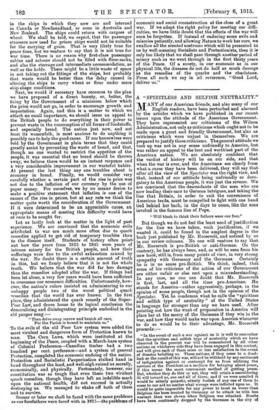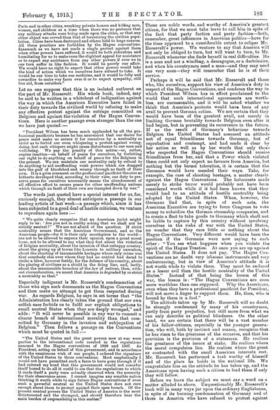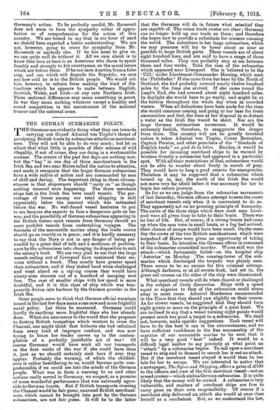A "SPIRITLESS AND SELFISH NEUTRALITY."
MANY of our American friends, and also many of our English readers, have been perturbed and alarmed by the articles which we have published in our recent. issues upon the attitude of the American Government. They have represented our criticisms of the Wilson Administration, not only as criticisms which ought not to be made upon a great and friendly Government, but also as criticisms which were unjust in themselves. We are prepared to justify those criticisms. The general attitude we took up was not in any sense unfriendly to America, but was rather an appeal to the best and worthiest part of the American nation. We are absolutely confident that the verdict of history will be on our side, and that when the war is over, and the Americans see clearly from what a curse they have been delivered, they will say that after all the view of the Spectator was the right view, and that, instead of our attitude being unfriendly or dero- gatory to the American people, it was just the reverse. We are convinced that the descendants of the men who are now lending their ears to German intrigues, and taking the line that Britain, in order to suit the convenience of American trade, must be compelled to fight with one hand tied behind her back, in the days to come, like the sons invoked in the famous line of Pope, "Will blush to think their fathers were our foes."
But though we do not feel the least need of justification for the line we have taken, such justification, if we wanted it, could be found in the amplest degree in the book just published by Mr. Roosevelt, and noticed by us in our review columns. No one will venture to say that Mr. Roosevelt is pro-British or anti-German. On the contrary, he has always been, and, as will be seen from his new book, still is, from many points of view, in very strong sympathy with Germany and the Germans. Certainly he is in no sense pro-British. We think, indeed, that some of his criticisms of tho action of our Government are either unfair or else rest upon a misunderstanding. In any case, no one can doubt that Mr. Roosevelt is first, last, and all the time pro-American. He stands for America—rather aggressively, perhaps, in the opinion of some people, though not in the opinion of the Spectator. Yet he condemns what he calls the "spiritless and selfish type of neutrality " of the United States in language far stronger than any we have used. After pointing out how the want of preparation in America will place her at the mercy of the Germans if they win in the war, and bow they would make war upon America whenever to do so would be to their advantage, Mr. Roosevelt proceeds:— "In the event of such a war against us it is well to remember that the spiritless and selfish typo of neutrality which we have observed in the present war will be remembered by all other nations on whichever side they have been engaged in this contest, and will give each of them more or less satisfaction in the event of disaster befalling us. These nations, if they come to a dead- lock as the result of this war, will not be withheld by any sentiment of indignation against or contempt for us from utilizing the services of the President as a medium for bringing about peace, if this seems the most convenient method of getting peace. But, whether they do this or not, they will- retain a smouldering ill will toward us, one and all of them; and if we were assailed it would be utterly quixotic, utterly foolish of any one of them to come to our aid no matter what wrongs were inflicted upon us. It would be quite impossible for any porter to treat us worse than Belgium has been treated by Germany or to attack 'us with less warrant than was shown when Belgium was attacked. Bombs bare been continually dropped by the Germans in the city of Paris and in other cities, wreaking private houses and killing men, women, and children at a time when there was no pretence that any military attacks wore being made upon the cities, or that any other object was served than that of terrorizing the civilian popu- lation. Cities have been destroyed and others held to huge ransom. All these practices are forbidden by the Hague conventions. Inasmuch as we have not made a single protest against them when other powers have suffered, it would be both ridiculous and humiliating for us to make even the slightest appeal for assistance or to expect any assistance from any other powers if ever we in our turn suffer in like fashion. It would be purely our affair. We would have no right to expect that other powers would take the kind of action which we ourselves have refused to take. It would be our time to take our medicine, and it would be folly and cowardice to make wry faces over it or to expect sympathy, still Jess aid, from outsiders.'
Let no one suppose that this is an isolated outburst on the part of Mr. Roosevelt. His whole book, indeed, may be said to be written in a whitebeat of indignation against the way in which the American Executive have failed in their duty towards the civilized world by refusing to make any effective protest against the outrage committed on Belgium and against the violation of the Hague Conven- tions. Here is another passage even stronger than the one we have just quoted:—
" President Wilson has been much applauded by all the pro- fessional pacificists because he has announced that our desire for peace must make us secure it for ourselves by a neutrality so strict as to forbid our even whispering a protest against wrong- doing, lest such whispers might cause disturbance to our ease and well-being. We pay the penalty of this action—or, rather, supine inaction—on behalf of peace for ourselves, by forfeiting our right to do anything on behalf of peace for the Belgians in the present. We can maintain our neutrality only by refusal to do anything to aid unoffending weak powers which are dragged into the gulf of bloodshed and misery through no fault of their own. It is a grim comment on the professional pacificiat theories as hitherto developed that, according to their view, our duty to pre- serve pease for ourselves necessarily means the abandonment of all effective effort to secure peace for other unoffending nations which through no fault of their own are trampled down by war."
The words just quoted have a special interest for us, for, curiously enough, they almost anticipate a passage in our leading article of last week—a passage which, since it has been subjected to a good deal of hostile criticism, we venture to reproduce again here " We quite clearly recognize that an American jurist might reply to us Are you not in reality asking that we shall not be strictly neutral 1'' We are not afraid of the question. If strict nentrality means that the American Government, and so the American people—for it is their only mouthpiece to the world— are not to be allowed to express their opinion upon a great moral issue, not to be allowed to say what they feel about the violation of Belgian neutrality, about the invasion of that unhappy country, about the giving up of towns like Louvain to military execution, about the shooting of innumerable hostages whose only crime was that somebody else over whom they had no control had dared to strike a blow, however feebly, for the defence of his country, about the placing of civilians as a shield in the firing line, and, lastly, about the innumerable breaches of the law of nations, then, with- out circumlocution, we assert that America is degraded by no strict a neutrality as that."
Especially indignant is Mr. Roosevelt's condemnation of those who alga such documents as the Hague Conventions and then make no attempt to get them respected during war. As regards Belgium, he says in set terms that "the Administration has clearly taken the ground that our own selfish ease forbids us to fulfil our explicit obligations to small neutral States when they are deeply wronged," and adds : "It will never be possible in any war to commit a clearer breach of international morality than that com- mitted by Germany in the invasion and subjugation of Belgium." Then follows a passage on the Conventions which must be quoted in full:—
"The United States and the great powers now at war were parties to the international code created in the regulations annexed to the Hague conventions of 1899 and 1907. As President, acting on behalf of this government, and in accordance with the unanimous wish of our people, I ordered the signature of the United States to these conventions. Most emphatically I would not have permitted such a farce to have gone through if it had entered my head that this government would not consider itself bound to do all it could to see that the regulations to which it made itself a party were actually observed when the necessity for their observance arose. I cannot imagine any sensible nation thinking it worth while to sign future HALM° conventions if even such a powerful neutral as the United States does not care enough about them to protest against their open breach. Of the ' present neutral powers the United States of America is the most disinterested and the strongest, and should therefore bear the main burden of responsibility in this matter." These are noble words, and worthy of America's greatest citizen, for that we must take leave to call him in spite of the fact that party faction and party fashion—both, remember, great influences in American politics—have for the time appeared to a considerable extent to eclipse Mr. Roosevelt's power. We venture to say that America will not only be obliged to turn, but will want to turn, to Mr. Roosevelt whenever she finds herself in real difficulties. He is a man and not a windbag, a demagogue, or a doctrinaire, and when his countrymen need a man—and they may need one very soon—they will remember that he is at their service.
Perhaps it will be said that Mr. Roosevelt and those who, like ourselves, support his view of America's duty in respect of the Hague Conventions, and condemn the way in which President Wilson has in effect proclaimed to the world that such international agreements are worth. less, are unreasonable, and it will be asked whether A913 think that America's protests would have been of any avail to prevent German action. We are certain that they would have been of the greatest avail, not merely in limiting German brutality towards Belgium even after it had begun, but in preventing its recurrence in the future. If as the result of Germany's behaviour towards Belgium the United States had assumed an attitude not of equal friendliness towards Germany, but of reprobation and contempt, and had made it clear by her action as well as by her words that only thews who respected the Hague Conventions should receive friendliness from her, and that a Power which violated them could not only expect no favours from America, but nothing but the barest toleration, it is certain that the Germane would have mended their ways. Take, for example, the case of shooting hostages, a matter clearly against the Hague Conventions. The holocausts made merely to strike terror would probably not have boon considered worth while if it had been known that they would lead to an attitude of hostile neutrality being adopted by the United States. When, however, the Germans find that, in spite of such acts, the American Executive are trying to force Congress to vote money to subsidize the German steamship companies, and to create a fleet to take goods to Germany which shall not be liable to capture by this country without involving ourselves in the risks of war with the United States, no wonder that they care little or nothing about the Hague Conventions. Very different would have been the position if the Germans were now saying to each other : "You see what happens when you violate the spirit of the Hague Treaties. At once you are up against the United States. It does not pay. The Hague Coa- ventions are no doubt very irksome instruments and very embarrassing, but in view of America's attitude it is not worth while to violate them. They must be endured as a lesser evil than the hostile neutrality of the United States." Instead of that being the lesson of this war, the lesson is : "The Hague Conventions are even more worthless than one supposed. Why the Americans, oven when they have a professional pacificist for President, will not move a finger to support them. He, then, who is bound by them is a fool."
The attitude taken up by Mr. Roosevelt will no doubt be strongly condemned by many of his countrymen, partly from party prejudice, but still more from what we can only describe as political blindness. On the other hand, we are certain that there will be a vast number of his fellow-citizens, especially in the younger genera- tion, who will, both by instinct and reason, recognize that he has risen to the greatness of the occasion, and that his prevision is the prevision of a statesman, He realizes the greatness of the issues at stake. He realizes where the moral compulsion lies. He realizes where the great as contrasted with the small American interests rest. Mr. Roosevelt has performed a task worthy of himself and of the place he holds in the national life. We congratulate him on the attitude he has taken up, and the Americans upon having such a citizen to lead them if only they will follow.
Before we leave the subject we must say a word on a matter alluded to above. Unquestionably Mr. Roosevelt's book will in many ways jar upon the ordinary Englishman, in spite of its burning condemnation of Germany and of those in America who have refused to protest against
Germany's action. To he perfectly candid, Mr. Roosevelt does not seem to have the sympathy either of appro- bation or of comprehension for the action of this country. We are bound to say that in our hour of need we should have expected a better understanding. We are not, however, going to crave for sympathy from Mr. Roosevelt or anybody else. If he has none to give us, we can quite well do without it. All we care about is to know that here at least is an American who dares to speak frankly and strongly to his countrymen on the moral issues which are before them. If he can save America from a false step, and one which will degrade the Republic, we care not how cold he is to the British people. We would ask him, however, to refrain from making the kind of die- tinctions which he appears to make between English, Scottish, Welsh, and Irish—at any rate Northern Irish. These sectional differences may mean something iu peace. In war they mean nothing whatever except a healthy and sound competition in the maintenance of the national honour and the national arms.








































 Previous page
Previous page